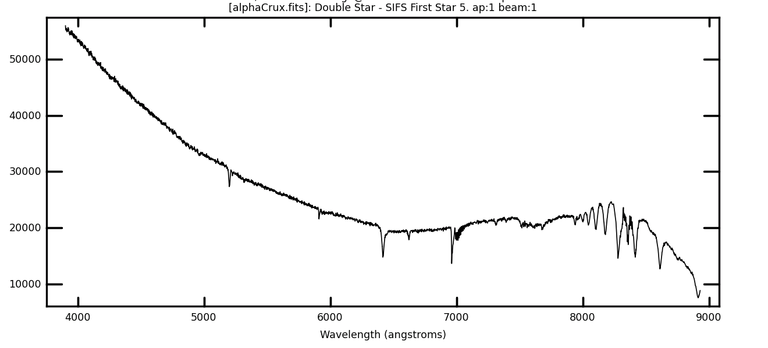SIFS First Light
The SOAR Integral Field Spectrograph (SIFS) obtained its first spectrum of an astronomical object on the night of 28th April. The first target was the bright star HR4023, the second an even brighter double star Alpha Crucis. SIFS was built at the Laboratorio Nacional de Astrofisica in Brazil, and delivered to SOAR in December. Since then the instrument team have made three trips to the telescope to assemble and test the instrument, in preparation for the successful first light on the night of 28th April. The team members in Chile, on this occasion, where Keith Taylor, Cesar Oliviera, Flavio Ribeiro and Fransisco (Chicao) Rodriguez. They were accompanied on the mountain by Sergio Scarano and Luciano Fraga of the SOAR Scientific staff, and Patricio Ugarte and Alberto Pasten of the SOAR operations staff. The instrument consists of three sub-systems:
- A fore-optics module that is mounted on a side port of one of SOAR's Nasmyth Instrument Selector boxes. This contains re-imaging optics to allow the selection of different scales, and a microlens array which dissects the SOAR focal plane into segments focusing the light from each "tile" onto an optical fibre
- a 14m long fibre bundle containing 1300 fibres (affectionately known as the "anaconda")
- a bench spectrograph, the output ends of the fibres are aligned to form a "pseudo slit at the focus of the collimator which has an off-axis catadioptric design. The dispersing element is a Volume Phase Grating six of which can be installed in the spectrograph at any time in a jukebox style interchange mechanism. The camera is an all transmissive design, which feeds a 4kx4k E2V CCD231 detector.
The initial observations used a 700l/mm grating, which gives a resolving power R~1000, with the grating and Camera angles set to centre on H-alpha. Since the acquisition camera had not yet been installed in the fore-optics module the targets were acquired, and centered on the microlens array "by eye" with Keith Taylor and Cesar Oliviera working out on the Nasmyth platform. Day time integration and alignment work, and night time testing, including observations of standard stars to measure throughput, will continue during the reminder of this week .
Updated on January 28, 2025, 11:11 am
